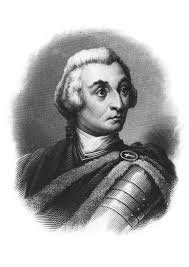James Oglethorpe was the founder of Georgia, a member of Parliament, and a philanthropist. He is considered a social reformer and used what he believed to be the worthy poor to settle the land in Georgia.

Jump to:
Overview
- James Oglethorpe was born in Surrey, the son of Sir Theophilus Oglethorpe of Westbrook Place, Godalming, and his wife Eleanor Lady Oglethorpe.
- He attended Corpus Christi College, Oxford, in 1714, but in the same year left to join the army of Prince Eugene of Savoy.
- He became aide-de-camp to the prince during the Austro-Turkish War and served with distinction in the campaign against the Turks.
- He returned to England and was elected Member of Parliament for Haslemere in 1722.
- He became a leading humanitarian, and in 1728, he advocated reform of the terrible conditions experienced by sailors in the British Royal Navy by publishing an anonymous pamphlet, 'The Sailors Advocate.
- In 1728, Oglethorpe chaired a Parliamentary committee on prison reform. The committee documented horrendous abuses in three debtors' prisons. As a result of the committee's actions, many debtors were released from prison with no means of support.
- Oglethorpe saw the need for these debtors to have a fresh start. This is where the idea of the Georgia colony originated.
- Oglethorpe's plan envisioned a system of "agrarian equality" designed to support and perpetuate an economy based on family farming and prevent social disintegration associated with unregulated urbanization. Land ownership was limited to fifty acres, a grant that included a town lot, a garden plot near town, and a forty-five-acre farm. Self-supporting colonists were able to obtain larger grants, but such grants were structured in fifty-acre increments tied to the number of indentured servants supported by the grantee. Servants would receive a land grant of their own upon completing their term of service. No one was permitted to acquire additional land through purchase or inheritance.
- Oglethorpe arrived with cotton seeds. This was the first time that cotton was grown in the New World. It would become the driving crop throughout the South and be the primary cause for the expansion of slavery.
- Oglethorpe and the first colonists arrived at South Carolina on the ship Anne in late 1732 and settled near the present site of Savannah, Georgia, on 1 February 1733.
- He negotiated with the Yamacraw to acquire the land for the colony. After establishing the land, he built a series of forts to protect the colony.
- Georgia would be positioned between Spanish Florida and the English Carolinas.
- Oglethorpe banned slavery from Georgia. However, over time and economic pressure, slavery became legal in the colony.
- He successfully raided St. Augustine, Florida
- After his exploits in Georgia, Oglethorpe returned to London in 1743 and rose steadily through the ranks of the British Army.
- He would never return to Georgia
- These were the days of the "Young Pretender" and incursions by the Jacobite troops from Scotland into the North of England. Oglethorpe had been busy forming a unit of Rangers, which were to be shipped out to defend Georgia from future Spanish attacks. He immediately put his troops at the disposal of the government forces under the command of the Duke of Cumberland, who was attempting to suppress the rebellion.
- Oglethorpe and his troops joined with Cumberland at Preston and attempted to harry the retreating Jacobite army as they tried to escape back to Scotland. He fought a skirmish at Shap Fell in Westmorland, but he was forced to break off the engagement by the intense weather and take shelter for the night. Overnight, the Jacobites managed to withdraw and escape over the fell. Because of this, Oglethorpe was court-martialled on the accusation of not pursuing the invaders more aggressively.
- He was acquitted and attained the rank of General but was never again given a command
- In 1785, James Oglethorpe met with John Adams, who was serving in England as a diplomat. He expressed the disappointment of the American Revolution and the continued friction between the two countries.
- James Oglethorpe died in 1785. He is the only colonial founder to witness the founding of a colony that then became part of an independent nation.
